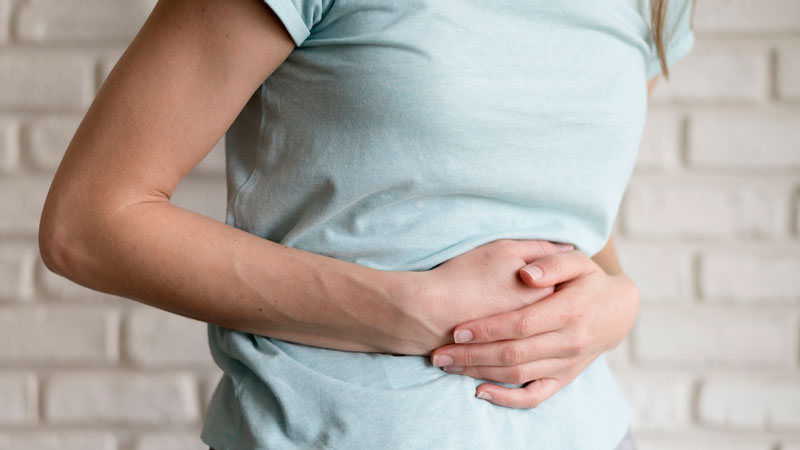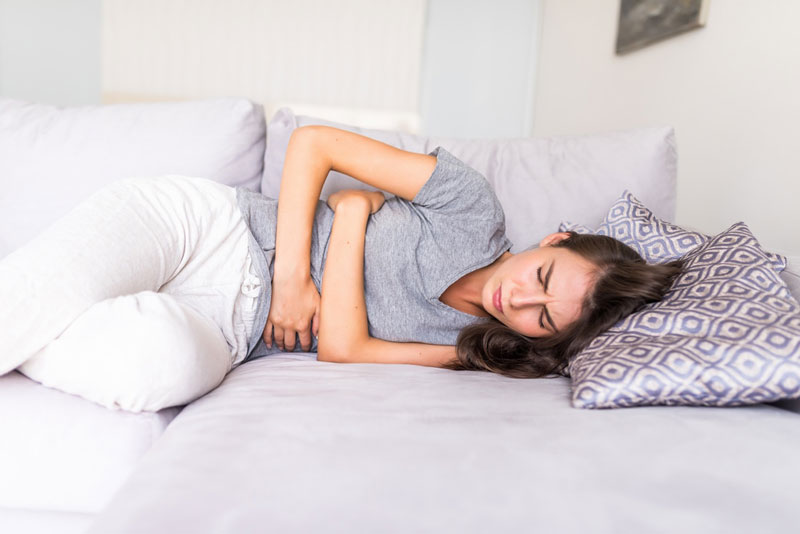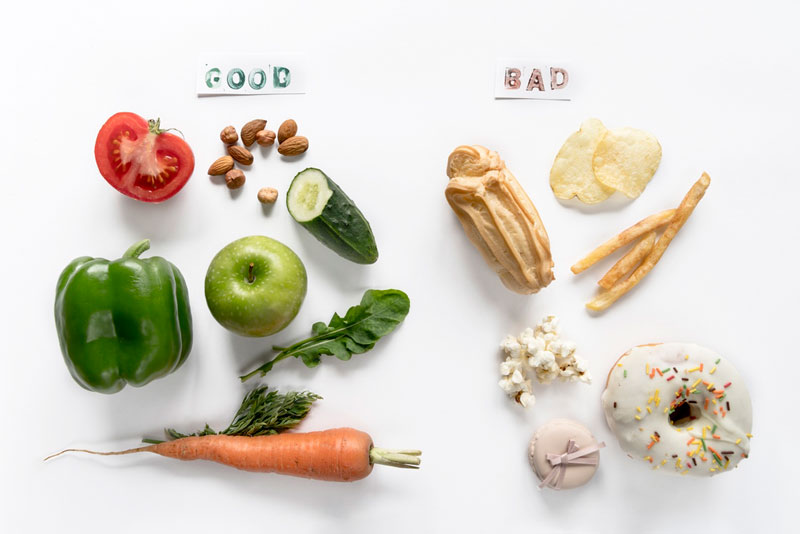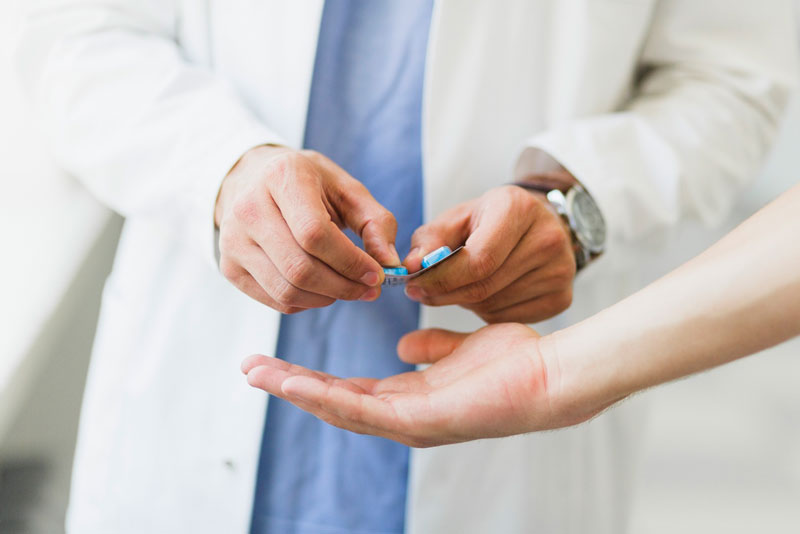Abdominal distension is an abnormal outward distension of the abdomen that can be seen and measured, and sometimes can be felt. Abdominal distension can be caused by bloating due to gas, or it can be caused by fluid, tissue, or digestive material accumulation. It can be chronic or acute.
1. General information about bloating
What is bloating?
A distended abdomen is a visible swelling of the abdomen beyond its normal size. It is often accompanied by a feeling of fullness due to gas or digestive matter. However, bloating is not always caused by digestion, and can be caused by other problems such as gas, pregnancy, stuck stool, or fat.
Bloating can be acute – occurring suddenly and out of the blue – or chronic. Chronic bloating accompanied by an uncomfortable feeling of fullness is often related to a digestive problem.

Bloating is a feeling of fullness and heaviness in the abdomen.
2. Why does bloating occur?
2.1. Gas accumulation in the stomach
Bloating is often related to gas accumulation in the stomach. At that time, the patient may experience symptoms such as continuous belching, sudden urge to defecate, and dizziness.

Gas in the stomach can easily cause symptoms of bloating and belching
Bloating due to gas accumulation in the stomach sometimes only causes discomfort for a short time. However, there are cases where the patient experiences severe pain. Usually, this uncomfortable symptom will subside after a few hours.
The main causes of gas accumulation in the stomach, causing bloating can be due to consumption of inappropriate foods or drinks, stomach infections, side effects of certain medications, indigestion.
2.2. Infections
Gastrointestinal infections tend to occur when the stomach lining is damaged, viruses, bacteria or other harmful agents invade. In addition to bloating, the patient also has a few other symptoms such as loose stools and abdominal pain.
Symptoms of bloating due to gastrointestinal infections will gradually subside after a few days. However, there are also cases where the patient becomes dehydrated and requires medical intervention.
2.3. Indigestion
Indigestion can easily lead to bloating. The main causes of this condition are eating or drinking too much or eating food that is difficult to digest, side effects of certain medications, or an infection in the digestive tract.

Indigestion can be the cause of bloating symptoms.
In addition, in some cases, indigestion causing bloating is also a sign that the body is suffering from dangerous diseases such as stomach cancer, stomach ulcers, etc.
2.4. Water retention
The habit of eating salty foods, changes in hormones in the body, and consuming inappropriate foods can easily lead to water retention. This is one of the causes of bloating in women before menstruation or pregnant women.
However, if the condition of water retention persists, the patient may be suffering from diseases related to the kidneys, liver, and diabetes.
2.5. Constipation
The common causes of constipation causing bloating are a diet low in fiber, the body having difficulty digesting food, intestinal disorders, side effects of medications, and mineral deficiencies (Magnesium).

Constipation due to lack of fiber can easily cause bloating.
In most cases, bloating due to constipation will subside after applying some interventions such as using laxatives, actively drinking plenty of water, maintaining daily exercise, etc.
2.6. The body has difficulty tolerating food
In fact, many people have difficulty tolerating food, leading to bloating and flatulence. In this case, you just need to stop consuming foods that are easily allergenic or unsuitable.
2.7. Paralytic ileus
This is a syndrome of some functional disorders, affecting intestinal motility. At that time, the nervous system inside the stomach will be affected, no longer functioning properly, causing indigestion.
In addition to bloating and flatulence, patients also experience other symptoms such as difficulty defecating, feeling full quickly, loss of appetite, nausea, heartburn.
3. When should people with bloating see a doctor?
People with bloating need to see a doctor quickly if they notice the following symptoms:
- Bloating lasts for more than 3 weeks.
- Signs of bloating appear frequently (more than 12 times per month).
- Bloating symptoms continue even after adjusting diet and lifestyle.
- Detecting abnormal tumors.
- Bloating affects movement.
4. Methods of diagnosing and treating bloating
4.1. Diagnosis
To diagnose bloating related to a dangerous disease or just a normal symptom, the doctor will first perform a clinical examination. Then prescribe the patient to do other tests and imaging diagnostics, such as gastrointestinal endoscopy, abdominal ultrasound, abdominal X-ray, etc.
4.2. Treatment
If bloating is not a sign of a serious illness but is only related to a common intestinal disorder, the doctor will prescribe the patient some medications. For example, probiotics, antacids, laxatives, drugs that regulate intestinal motility, etc., depending on the condition.

People with bloating can take medication as directed by their doctor.
Note that, when taking medication, patients must follow the doctor’s instructions on dosage and duration of medication.
In addition, people with bloating are also advised to combine a few other supportive measures such as:
- Walking 20 – 30 minutes daily, stimulating intestinal motility.
- Practicing yoga helps release vaginal gas, supporting the digestive tract.
- Gently massaging the abdomen helps stimulate intestinal motility and the digestive tract.
- Take a warm bath, combined with abdominal massage.
- Actively supplement fiber from green vegetables and fruits (about 30g of fiber, for adults).
5. How to prevent bloating?
You can proactively prevent bloating by maintaining a healthy lifestyle and a balanced diet. Specifically:
- Prioritize adding fiber to your diet: Fiber in vegetables and fruits is especially good for the digestive system. Specifically, this group of substances will support the process of cleaning the digestive tract, supporting the process of eliminating and purifying the body. The amount of fiber that adults need to supplement each day is about 30g.
- Supplement enough water: Water participates in most reactions in the body, supports intestinal motility, helps soften food, and purifies toxins. Therefore, you should drink enough water every day (about 2 liters of water/day).
- Maintain an exercise habit: Every day, you should spend about 30 minutes doing moderate exercise, stimulating intestinal activity, limiting bloating.
- Limit the consumption of processed foods: Processed foods are often foods that are poor in fiber, contain a lot of preservatives, fat, salt, … are not good for the body, and can easily cause indigestion.
- Limit or give up the use of stimulants: Such as alcohol, beer, carbonated drinks, cigarettes.
- Eat in moderation: You should chew thoroughly, do not eat too much or too little, and can divide meals into smaller portions to aid better digestion.





